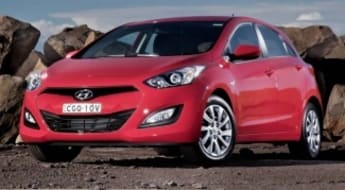Hyundai's form in the wagon department stretches back almost fifteen years with the courier's favourite, the curvy Lantra wagon. The new i30 Tourer landed about a year ago and we were impressed. To see if our experiences with the car were justified, we've got our hands on the top-selling Active as a long-termer to see if it can cope with the demands we've been saving up for it.
Value
The Tourer range starts with the petrol-engined manual Active opening the bidding at an entirely reasonable $24,990. For $2250 extra you can have a six-speed automatic. The diesel manual starts at $27,590 and asks the same $2250 for automatic. The range finishes at $33,440 for the Elite.
The Active specification comes with a six-speaker stereo with USB, Bluetooth and MP3 CD; remote central locking; cruise control, projector headlamps; cloth trim; and trip computer. There's even a full size spare of the same design of alloy wheels as those fitted to the outside.

The only option for the Czech-built Hyundai Tourer is metallic paint at $495. The colour palette is restricted to four colours, two solid, two metallic.
Design
Hyundai i30 is not a bad car to start with but the wagon addition is well integrated and may just be the best looking of the range. The Active comes with 16-inch alloys, roof rails, spoiler and LED driving lights for a touch of sophistication.
While the wagon stretch is restricted to the bodywork it adds a staggering amount of space. Rattling around the boot when you take delivery is a removable cargo blind and vertical cargo net that can be fitted behind the front seats when you've got a big load.
The tailgate opens high and wide to a floor flush with the rear bulkhead which means easy loading and, as we discovered, a good place from which to picnic in the rain. The boot floor hides a few good sized bins in the space around the spare and there are pockets and nets either side.
The boot size and shape actually compares favourably to much larger cars - a VF Commodore Sportwagon's boot doesn't appear to swallow a lot more than the i30 but is in a substantially larger package. Incidentally, the i30 Tourer has more boot volume with the seats up than its big brother the ix35 SUV. The cabin is standard i30, a mature easy-on-the eye design with plenty of storage scattered throughout.
Safety
The i30 comes standard with seven airbags (including knee bag for the driver), ABS, traction and stability control and seatbelts with load limiters and pretensioners.
Infotainment
A small touchscreen controls the stereo and phone functions (some controls are replicated on the steering wheel). It also displays the time. It's simple and straightforward and works fine. The six-speaker stereo won't make your ears bleed either from poor quality or by having too much power. It's perfectly adequate for most of us. Plugging in your phone via USB gives some extra functionality over Bluetooth as well as displaying album art and playlist selection.
Engine / Transmission
The diesel in the Tourer is Hyundai's 1.6 litre turbo, coupled to the company's own six-speed automatic transmission. It produces 94 kW at a high-ish 4000 rpm along with a 260 Nm of torque between 1900 rpm and 2750 rpm. Hyundai claims 5.8 litres per 100 km. The engine also features a drive-by-wire throttle but conspicuous by its absence - as it is across the Hyundai range - is stop-start.
Driving
In normal running, the i30 keeps up with traffic far better than we suspect the petrol might. The turbo-diesel provides plenty of power and torque to move a car filled to roof after a long-weekend trip to Bunnings and has the brakes to match. Progress is smooth, the only downside being that the single mode transmission is a less-than-keen downshifter.
Towing capacity is an impressive 650 kg unbraked and 1500 kg braked. The multi-link rear suspension helps keep things in check. Thanks to its multi-link rear and the already-tidy handling courtesy of the Australian tuning, Hyundai i30 is an uncommonly handy device.
Forgetting the gimmicky user-selectable Flex steer (stick it in Normal and never touch it again), the Tourer is great fun to fling around. You do have to drive around the tardy throttle response and take control of the shifting (and if you do want to shift the transmission manually, the up and down are the "wrong" way around to my way of thinking).
Grip is impressive given the weight over the nose and it takes a bit of work to make the car understeer. Understeer it will, of course, but not to the degree of some of its rivals.
The engine is clearly diesel when you listen, with a bit of start-up clatter and the occasional blast of smoke on full throttle. It's not especially quiet, but if you've heard the average Hyundai petrol, it's less of a coarse buzz and more a gravelly grumble.
In the cruise it's much quieter, with tyre, wind and engine noise well-damped, but you'll still need to raise your voice slightly for the back seat passengers. The seats are comfortable for longish trips, front and back although rear middle seat passengers will be a little squeezy.
Hyundai I30 2014: Active
| Engine Type | Diesel Turbo 4, 1.6L |
|---|---|
| Fuel Type | Diesel |
| Fuel Efficiency | 5.8L/100km (combined) |
| Seating | 5 |
| Price From | $7,920 - $11,220 |
| Safety Rating |
|
Verdict
The i30 has settled into family life, dealing with ongoing minor renovation work slightly better than its predecessor, the ix35. It's an easier car to load and get around in with its more compact size but gives nothing away in the space race.
It's also good looking and when the mood takes, a bit of fun to drive with a grippy, forgiving chassis. It won't be scaring any supercars or hot hatches, but all the same, it's good fun. There's a long trip planned to see how it fares with holiday distances as well as continuing its role as load-lugger. The early signs are good.
Pricing Guides

Range and Specs
| Vehicle | Specs | Price* |
|---|---|---|
| Active | 1.6L, Diesel, 6 SPEED AUTOMATIC | $7,920 - $11,220 |
| Active | 1.6L, Diesel, 6 SPEED MANUAL | $7,370 - $10,340 |
| Elite | 1.6L, Diesel, 6 SPEED AUTOMATIC | $8,470 - $11,880 |




.jpg)
.jpg)
.jpg)
.jpg)

.jpg)
.jpg)
.jpg)
.jpg)

.jpg)

.jpg)










.jpg)
.jpg)
Comments